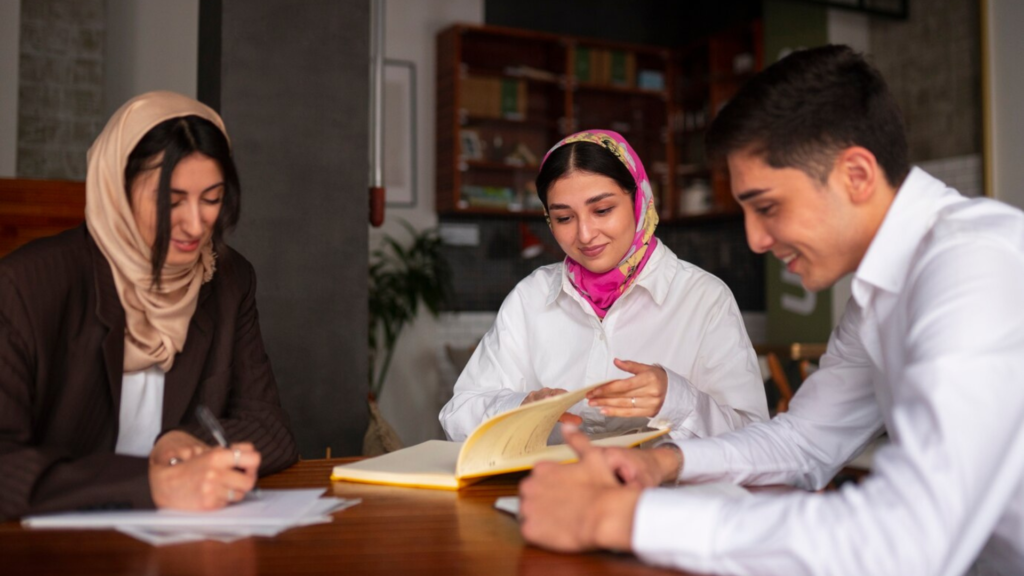The Concept of Accountability in Islamic Teachings
The paper talks about social responsibility from the point of view of Islam, looking at its fundamental ideas and how they fit into religious relationships. Five of them control the moral framework and set the standards for social responsibility in Islam: coherence, harmony, free choice, duty, and righteousness. The article explains how Islam's social and economic justice is carried out through paying the religious tax (zakat) on income and property, setting up charitable foundations (waqf), giving alms (sadaqah), and giving free loans (al-qard al-hasan), among other things.
It is said that the prohibition on interest (riba) is a key part of the Islamic philosophy of social responsibility and sustainable development. The article's method is to look at the main sources of Islamic theology in order to define the main themes and specifics of social responsibility in Islam. The article also uses the comparative technique to show how the idea of social responsibility in Islam is similar to and different from that in other cultures and religions. The most common definition is that social responsibility is a portion of economic, social, environmental, moral, and legal spheres that can't be separated from each other in order to meet the needs of society.
Annotation

One of the most important things that needs to happen for civil society to grow is that everyone needs to have a strong sense of social duty. In this article, social responsibility is only looked at in terms of how a certain religion works. It is important to point out the parts of its content that would make it easier to define its main points and how it is different in terms of religious relations. Theoretical foundations for understanding the nature of social responsibilities are an implicit part of Islamic teachings.
The five basic ideas that make up the moral system in Islam are unity (the idea that God is one), balance (the idea that justice is the same for everyone), free will (the idea that people have some freedom to live their lives as God's vicar on Earth), duties (the idea that you are responsible to God for your actions), and virtue. Islamic scholars point to the payment of religious taxes (zakat) on income and property, the creation of charitable foundations (waqf), almsgiving and charity (sadaqah), interest-free loans (al-qard al-hasan), and other similar actions as the ways that these ideas can be put into practice.
Introduction

The prohibition of charging and paying interest (riba), which is what Islamic banks are based on, is another important rule of this system. The third one comes from the words of the Prophet Muhammad, who said that Allah loves the servant who does the most good for society. The things you do to make a believer happy, like taking away some of their worries, fulfilling their needs, and paying off their debts, are more important to Allah than living in the mosque and praying all month. To me, the best thing to do is to listen to someone and do everything you can to make them happy.
Allah will cover up the shortcomings of the person who hides their animosity and anger against someone else. On the day of judgment, God will be happy with anybody who holds back their anger when they could have gotten revenge. "Allah says to the person who helps him get what he needs from his fellow Muslim brother, 'I will stabilize your feet on the bridge of Sirat, but the feet of other people will shake and lose their step'" [5, p. 51]. One of the main ideas that show the sense of social responsibility in Islam is the remark of the Prophet Muhammad: "Everyone is a shepherd and every shepherd is responsible for his flock."
Methodological and dogmatic foundations of social responsibility

The shepherd is in charge and is responsible for his livestock. And a man (father, spouse, brother, son, grandpa, or any other male relative in the paternal line) is a shepherd to his family and is responsible for them. And the woman is a shepherdess at her husband's house and is in charge of her flock. And the servant is in charge of taking care of his master's possessions, which is his job. You are all shepherds in your own right, and you take care of your own sheep. [4, p. 500]. Islam allows people to do everything as long as they follow the rules set by the religion and the government and don't hurt anybody else or themselves.
As long as it doesn't hurt society's interests or the rights of other people, human freedom is sacred and can't be taken away. Islam doesn't ignore people's interests, but it does teach that the interests of the ummah and society are more important than the interests of one person or a certain group of people when they clash with each other. According to Islamic law, the welfare of the city comes before the welfare of the individual [6]. There has been a lot of talk in scientific literature about the idea of social responsibility, but there is still no thorough description of this idea in the Russian religious structure.
Social responsibility at the personal and institutional levels

It needs to be made clear that the social responsibility of religious organizations is different because of the dogmatic rules and worldview of the people who run them, as well as the laws that apply to them in the legal system. The religious institution has a social responsibility, which means that its members should voluntarily help build society and solve social problems. This is done to add to the social responsibility of the state and to further develop the religious institution's understanding of the social impIt is, but most people won't believe me.
Judgment by the Almighty Allah is a big part of Islam since it means that a person can only do the right things and be kind. This is the only reward he gives for doing good. The Quran says, "We have sent you (O Messenger of Allah) as a mercy to the worlds." Do you see? Think about what the Quran says about how Muslims should treat those who are not Muslims. This poem is quite interesting: Allah doesn't say you can't treat people who treat you well fairly and nicely, even if they kick you out of your homes because of your religion. Allah loves the just. Surah 60, Ayah 8
Conclusion
That's correct! There aren't any extremes in Islam. If you meet a Muslim who prays a lot and has religious beliefs but doesn't recall that he or she is on Earth and needs something, it's not Islam. You can't evaluate someone based on their religion. In the Quran, Surah Al-Baqarah Ayah 143 says: We have chosen you [the Muslims] to be a midway nation so that you [the Muslims] can be witnesses over all people and the Messenger can be a witness over you [the Muslims]. We will look at other verses.
Allah does not want to make things hard for you; he wants to cleanse you and finish his grace on you (Quran 5:6). Quran 2:185 says that Allah does not want to make your life hard; instead, Allah wants to make it easier. It is then followed by the hope of ease and hardship at the same time: After rough times, things get easier. Ah, after the storm The calm comes. There is repose, but only with struggle. (Quran 94:5–6) Every society must follow these five norms. There are more good things about Islam than bad things, therefore the best thing to do is learn more about it before you make a decision.a
Komentar
Posting Komentar